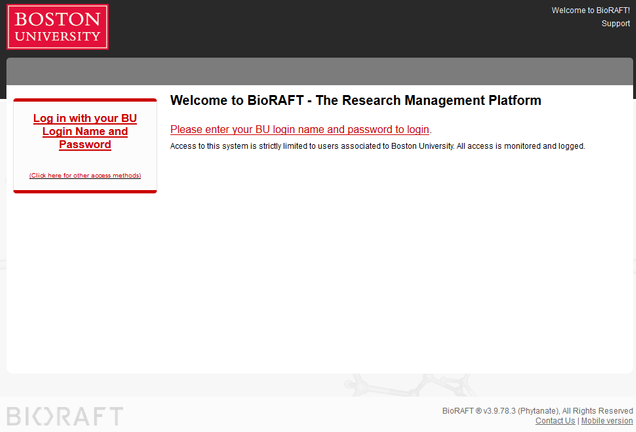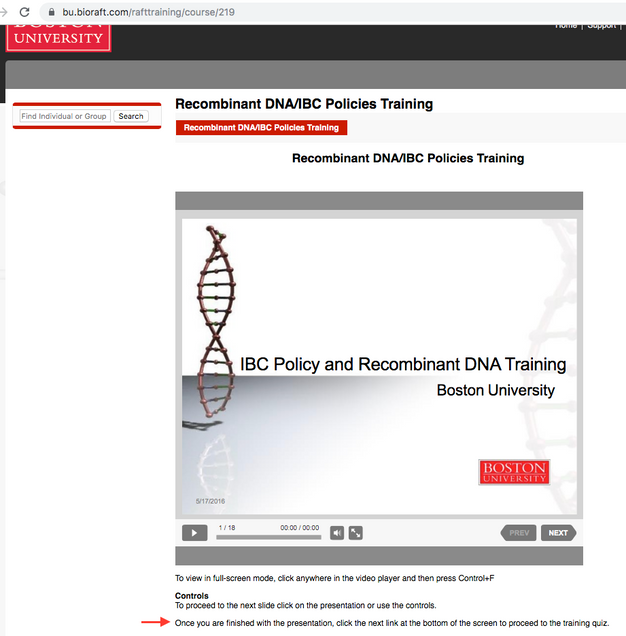IBC Training and Other Requirements
Training is a critical component of any integrated biological safety program. Training is intended to provide the understanding, technical knowledge, and tools that the trainee can use to improve his or her daily laboratory safety practices. Biosafety training is required for all laboratory workers (faculty, staff, students, and visiting scientists) at BU and BMC in addition to other requirements such as medical health clearances. The exact training and health clearance requirements for a particular person will depend on the hazards to which they are exposed.
IBC Training and Health Clearance Requirements Policy
The purpose of this policy is to set forth the training and health clearance requirements for individuals listed on active IBC protocols who will be handling recombinant and synthetic nucleic acid molecules; synthetic nucleic acid molecules, including those that are chemically or otherwise; cells, organisms and viruses containing such molecules; and biohazardous materials.
View PolicyMedical Clearances
All members listed in an IBC protocol must also secure medical clearance through the Research Occupational Health Program (ROHP) office before engaging in any protocol related activities. Please visit ROHP website to learn how to apply for this clearance and what medical information you have to provide. Prior to applying for this clearance, please make sure to discuss with your supervisor what biological materials you will be working with.
Mandatory IBC Training
The following trainings must be completed for all members of an IBC protocol by logging into Scishield website:
Laboratory Safety Training (LST)
Biosafety Level 1 & 2 Training
Chemical Safety Training
rDNA/IBC Policy Training
- Required for all PIs irrespective of any rDNA work in the protocol
- Required for all members of the protocol when it involves rDNA work
Laboratory-specific training
Agent-Specific Training
For researchers at both BUMC & CRC working with hazardous biological agents the principal investigator (PI) is responsible for either conducting or ensuring these agent-specific trainings are provided to members of their laboratory prior to an individual beginning work with hazardous biological agents. If the PI is unable to conduct the training, the ROHP may be requested to provide this training. The PI or the Lab Manager must maintain an updated agent-specific trainings and make it available for laboratory inspection. Topics covered by this training are subject to Institutional Biosafety Committee requirements.
A large number of agent-specific trainings are available in Scishield.
As of February 2025, following agent-specific trainings are available:
- Arenaviruses, Bunyaviruses, and Paramyxoviruses
- BSL-2 Flavivirus: West Nile Virus, Zika Virus, and Dengue Virus
- BSL-3 Flavivirus: Powassan virus and Yellow Fever Virus
- Chikungunya Virus
- Chlamydia trachomatis
- Coronaviruses
- Eastern Equine Encephalitis
- Ebola and Marburg Virus
- Francisella tularensis
- HIV
- Japanese Encephalitis Virus
- Myobacterium tuberculosis
- Neisseria gonorrhoeae
- Orthopoxviruses
- Polio, Coxsackie, EV-D68, EV-D70, and EV-A71
- Pseudomonas aeruginosa
- Salmonella typhimurium
- Yersinia pestis
- Select Agent Training
Biosafety Level-3 Training
For researchers working in Biosafety Level 3 laboratories.
This training must be completed in Scishield by all personnel (faculty, staff, animal technicians, students, trainees, visitors) who will work with BSL-3 agents. Topics that will be addressed include operations, required PPE, procedures, emergency management, and other required information.
Select Agent Training
For researchers who are working with biological select agents or toxins, as required by the BU Select Agent program.
This training must be completed in Scishield by all personnel (faculty, staff, animal technicians, students, trainees, visitors) prior to receiving privileges to order, store, or use select agents. The training will cover topics including information on the hazards of specific select agents and the rules and regulations governing the use of these agents.
Laboratory Safety Training for Summer Programs
For students enrolled in summer programs at BUMC & CRC.
Boston University and Boston Medical Center often host summer programs that allow students to work in BU or BMC research or teaching laboratories. This training is customized to each program’s specific curriculum. Topics may include chemical and biological safety, fire and life safety, emergency management, waste management, and other information based on the program’s unique needs.
This training is provided by the EHS as needed.
Other potentially-required trainings based on protocol work
Shipping Training– when a protocol involves shipping or receiving biologically hazardous materials
Select Agent Training-when protocol involves work with any CDC/HHS select agents
BSL3 Training -for all members listed in a BSL3 protocol
NOTE: All above trainings can be completed by logging into Scishield website.
Completing the IBC Training Requirements
Accessing and completing IBC training
Step 1: Access and Registration
Step 2: Available Trainings
Step 3: Course Information
Step 4: Taking the Course
Step 5: Quiz
Step 6: Training Modules Requirement
PLEASE NOTE: The IBC may require additional trainings be completed as deemed appropriate.




